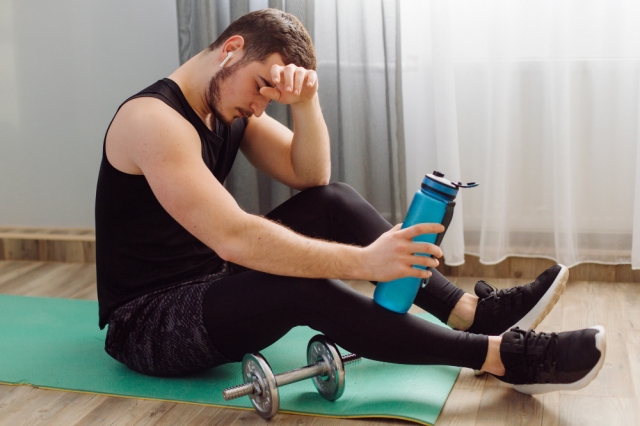Feeling sore after a workout might seem like a badge of honor, but it doesn't have to be. Stretching those tired muscles can significantly reduce tension and soreness. Just a few minutes of focused stretching can help improve flexibility and blood flow, setting you up for better recovery and future performances.
Don't overlook the power of nutrition when it comes to muscle recovery. Eating a balanced meal rich in protein and carbohydrates within the hour post-exercise aids in muscle repair. This refuels your body's energy stores and sets the stage for muscle growth.
Hydration is equally important. After sweating it out, your body craves replenishment of lost fluids and electrolytes. Drinking water and possibly a sports drink can help restore balance and prevent cramps. Prioritizing these simple steps will help keep your muscles happy and ready for your next workout.
Laying the Foundation for Optimal Recovery
After an intense workout, focusing on muscle recovery is crucial. Muscles need rest, hydration, and a balanced diet to repair effectively. The key points in recovery involve understanding how your body heals and the significant role of proper nutrition.
Understanding the Recovery Process
Muscle recovery is all about giving your body the care it needs after vigorous exercise. Rest is your biggest ally; take time off to allow muscles to repair and grow stronger. Adequate sleep, ranging between 7 to 9 hours, significantly aids this process. During sleep, growth hormones are released, facilitating tissue repair.
Hydration plays a vital role in recovery, too. Drinking enough water helps transport nutrients throughout your body, keeping energy levels stable. Inadequate hydration can lead to fatigue, making it difficult for muscles to recover fully.
The Role of Proper Nutrition
Nutrition fuels your recovery process, helping rebuild muscle fibers. Eating a balanced diet with a mix of protein, carbohydrates, and healthy fats is essential. Proteins are vital for building and repairing muscles. Foods like chicken, fish, beans, and tofu provide high-quality proteins.
Carbohydrates replenish energy stores used during your workout. Opt for whole grains, fruits, and vegetables to maintain energy levels. Healthy fats, found in avocados, nuts, and seeds, support cell function and can reduce post-exercise inflammation.
Post-workout meals should be consumed within 30 to 60 minutes to maximize recovery benefits. This timing helps restore glycogen levels and provides your muscles with essential nutrients for quicker recovery.
Active Strategies to Enhance Muscle Repair
Enhancing muscle repair after a workout involves engaging in light activities and incorporating techniques to alleviate muscle soreness and improve range of motion. These strategies are designed to support your body's natural recovery processes through movement and gentle stretching.
Engaging in Active Recovery
Active recovery is about maintaining movement with activities like walking, cycling, or swimming at a low intensity. This helps increase blood flow to muscles, aiding in the delivery of nutrients and removal of waste products. This not only speeds up recovery but also reduces muscle soreness.
Including a cooldown period after workouts can help transition your body from intense activity to rest. This prevents stiffness and promotes circulation. For optimal benefits, aim for 10-15 minutes of light activity immediately following your workout.
Implementing Stretching and Foam Rolling
Stretching can be an effective way to enhance flexibility and relieve tightness in muscles. Focus on dynamic stretches before a session and static stretches afterward, holding them for about 30 seconds each. This approach can help maintain and improve your range of motion.
Foam rolling serves as a form of self-myofascial release, which can alleviate soreness and take your recovery up a notch. Use the foam roller to apply pressure to muscles, roll slowly, and focus on tender areas. Regular foam rolling may improve muscle function by breaking down adhesions and increasing blood flow to tissues.
Advanced Techniques and Modalities
Boost your recovery time by using advanced techniques like massage and compression therapy, along with heat and cold treatments. These methods can ease muscle soreness and help you get back to working out sooner.
Using Massage and Compression Therapy
Massage can work wonders for sore muscles. Whether you use a professional therapist or a handheld massage gun, it helps to increase blood flow and reduce tension. Focusing on specific areas can ease stiffness, making it ideal post-workout.
Compression garments, such as tights and sleeves, apply gentle pressure to your muscles. This pressure promotes improved circulation, reducing swelling and fatigue. Wear them during your workout or as you go about your day for maximum benefits.
Combining these techniques can lead to noticeable improvements in how you feel after exercise. Try including these in your routine for quicker recovery.
Exploring Heat and Cold Treatments
Heat and cold treatments are another great way to tackle muscle recovery. Ice baths might seem intimidating, but they help reduce inflammation and numb soreness after an intense session. Spending just a few minutes in an ice bath can make a difference.
On the warmer side, Epsom salt baths provide a relaxing way to soothe tired muscles. The magnesium in the salts can relieve aches and promote relaxation. For a different approach, contrast water therapy alternates between hot and cold water, stimulating circulation and reducing muscle tension.
These treatments are easy to add to your routine and can be done right at home, offering convenient recovery options for you.
Supporting Recovery Through Lifestyle Choices
To enhance muscle recovery, it's important to incorporate good sleep routines, use supplements wisely, stay hydrated, and manage stress with regular rest days.
Maximizing Rest and Sleep Quality
Quality sleep is a game-changer for muscle recovery. Aim for 7-9 hours of sleep each night. Sleep is when your body repairs muscle tissue and releases growth hormones. Keep your bedroom cool, dark, and quiet to promote better rest.
Developing a pre-sleep routine, like dimming lights and avoiding screens, can prepare your body for rest. Consider using earplugs or sleep masks if necessary. Ensuring consistent sleep patterns supports overall recovery and energy levels.
Integrating Supplements and Hydration
Staying hydrated is crucial after exercising, as it helps your body function optimally. Water aids digestion and nutrient absorption, while rehydration supports muscle repair. Consider coconut water or electrolyte drinks for quick rehydration. Avoid alcohol post-workout—it can dehydrate you further.
Supplements such as protein powders, branched-chain amino acids (BCAAs), use Naked Whey ISO for quick muscle recovery or even cherry juice can aid recovery. Protein supports muscle growth and repair, while cherry juice can reduce muscle soreness. Choosing the right supplements can provide the nutrients you might miss from meals alone.
Acknowledging the Impact of Stress and Rest Days
Rest days are as vital as workout days. They let your muscles recover and prevent overtraining. Plan regular rest days in your weekly schedule. Focus on light activities like walking, yoga, or stretching to stay active without straining your body.
Stress can hinder recovery. Practice mindfulness or meditation to reduce stress levels. Being mindful of your body's cues can help avoid injuries and improve muscle repair. Allocating time for relaxation and ensuring your mental well-being positively impacts physical recovery.
Final Thoughts
After you finish your workout, it's important to focus on helping your muscles recover quickly. First off, stay hydrated. Drinking enough water aids in reducing muscle soreness and enhances nutrient transport to your muscles.
Try gentle stretching. This can help maintain flexibility and prevent stiffness. It only takes a few minutes, but your body will thank you later.
Refuel with a protein-rich snack. A protein shake or a handful of nuts can help repair muscle tissues. Eating within 30 minutes post-workout is a great way to maximize muscle recovery.
Get enough sleep. Quality rest promotes muscle repair and growth. Aim for 7-9 hours each night to ensure your muscles regenerate efficiently.
Consider foam rolling. This helps ease muscle tightness and improve blood circulation. Spend a few minutes on each muscle group for the best results.
Listen to your body. If you're feeling extra sore, take a rest day. Your muscles need time to heal effectively, and overdoing it can lead to injuries.






